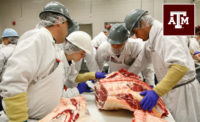It started off small, as just four students and a coach revived competitive meat judging at Texas A&M University-Commerce.
The group was off to big things in a hurry. In its first competition, the team really showed their chops. Madison Wynne, Colleen Hooge, Kris Barr, Katherine Bivins and Coach Haley Cole took home the grand champion prize at the National Western Intercollegiate Meat Judging Contest held on Jan 19-20 in Denveår, Colo.
The team competed in several categories: Beef Judging, Pork Judging, Lamb Judging, Total Placings (where competitors rank four cuts of meat from lowest to highest quality) and Total Questions (where competitors then answer questions about how they ranked the meat cuts).
Wynne finished with the highest overall individual score and was first in Pork Judging and Total Questions. Hooge had the highest individual score in Beef Judging and was first in Beef Grading. As a team, A&M-Commerce finished first in Beef Judging, Pork Judging, Total Placings and Total Questions.
Coach Cole is a graduate assistant in the College of Agricultural Sciences and Natural Resources at A&M-Commerce. She received a bachelor’s degree in animal science from the University of Wyoming and is currently pursuing her master’s in agriculture. She said the four-student team has proven to be a special group.
“They are genuinely good friends and they genuinely care greatly for each other,” Cole said.
A competitive meat judging team is required to have a minimum of four members. A&M-Commerce just meets that threshold, but the four students have already shown that they are capable of greatness.
“They have to work extra hard,” Cole said. “They have to step up and help each other since all four have to perform well.”
Dr. Randy Harp, dean of the College of Agricultural Sciences and Natural Resources, had high praise for the team.
“I am very proud of our students. In the inaugural year for A&M-Commerce to have an intercollegiate meat judging team, it is unusual to have a win at a national competition, especially at the first contest,” Harp said. “This represents a lot of hard work, discipline and responsibility outside the classroom by our students. At the same time, it is representative of the cooperation and support by administration and faculty to allow these students the opportunity to represent the university on a national/international stage.”
The A&M-Commerce team followed up their win with a strong third-place overall finish at the American Meat Science Association’s Southwestern Intercollegiate contest at the Fort Worth Stock Show and Rodeo on February 2. In that contest, Bivins won the Pork Judging contest.
Harp says that the students on the Meat Judging team are learning valuable life lessons and skills to take with them into the workforce.
“They are learning the skills to grade meat to the standards of USDA graders,” Harp said. “On top of that, they are learning about dedication, responsibility and competition.”
Harp added that competing on a Meat Judging team during his undergraduate college years helped propel him to graduate school.
“The support and the teaching I got from that experience helped me find my niche in academics,” he said.
Currently, A&M-Commerce is actively building up its meat and food science offerings. The university offers a B.S. in Agriculture Science and Technology with an Agriculture, Food and Family option, a minor in Food Studies and multiple food-related courses, including a course that follows food from farm to fork.
Through the Agriculture, Food and Family option, students can become certified Family and Consumer Sciences teachers, as well as learn the skills to be USDA meat graders and numerous other careers in the food industry. A&M-Commerce is the only university in northeast Texas to offer this teacher certification with an undergraduate degree.
A&M-Commerce offers plenty of food-focused courses in other disciplines as well. Out of 12 required freshman “Signature Courses” offered this year, three feature food as the main subject matter.
Dr. Bob Williams, professor of agriculture, food and family at A&M-Commerce, teaches a Signature Course called “Food-Choices, Challenges, & Consequences.” According to Williams, the university’s curriculum is currently focused more on food systems than on food sciences.
“Our courses address the social sciences aspect of food choices and the logistics of getting food from point A to point B,” Williams said. “Overall, this is part of what I would refer to as a sustainable food systems initiative.”
Twin Oaks Farm for Experiential Learning, owned by the university and located just a few miles from campus, offers hands-on learning to A&M-Commerce students. At the farm, students practice growing food. The farm is especially known for its blueberries, with seasonal pick-your-own sessions for the public.
Williams said that the farm provides great educational experiences for the surrounding community, too.
“We not only use it for hands-on learning, but we use it for educational outreach as well,” Williams said. “We often have school groups visit the farm, and it helps to improve their food literacy and realize just where food comes from.”
Harp stressed the importance of food sciences and food systems to the future of the industry.
“If you eat every day, as we do, you have to appreciate agriculture,” Harp said. “We see the finished product, and we assume that everything else was taken care of before that.”
Looking toward the future, A&M-Commerce envisions bolstering its offerings with a new Agriculture Education and Training Facility, which would include a meat and food processing laboratory.
Harp reflected that while food, meat and animal sciences programs are growing at A&M-Commerce, current offerings provide ample opportunities for students to learn.
“We are at the genesis of our food sciences programs, but at the same time, our students are being well-prepared for the food industry,” Harp said. IP
To learn more about A&M-Commerce’s offerings in animal and food science, visit https://new.tamuc.edu/agriculture/.
To find out more about graduate students programs, visit https://meatscience.org/students/graduate-programs.






